You may have heard the term SERPs and wonder what are SERPs? SERPs refer to the pages displayed by search engines in response to a user's query. They provide a snapshot of the digital landscape and are highly competitive spaces for businesses vying to gain visibility and attract organic traffic.
A well-executed SEO approach aims to improve a website's ranking on SERPs by optimizing various factors, including relevant keywords, meta tags, content quality, and user experience.
Appearing prominently on SERPs increases the likelihood of attracting clicks and driving targeted traffic to a website, ultimately leading to enhanced online visibility, brand recognition, and potential conversions.
Therefore, understanding SERPs and tailoring SEO efforts accordingly is vital for businesses seeking to thrive in the competitive digital landscape.
Here is what you will learn in this article:

If you are wondering what the word is SERPs since you’re new to Search Engine Optimization or SEO, then you are on the right page to help you answer the questions you have in mind.
Before you came to visit this page, you opened the Google search box first to make an online search, then search terms in “what are SERPs?” and eventually it shows the results of your keyword query.
You have unlocked a self-discovery stage about Google SERP.
Google's answer to a user's search query is known as Search Engine Results Pages (also known as "SERPs" or "SERP"). There are a lot of things you can see on the SERP features like organic search results, sponsored Google Ads results, Featured Snippets, Knowledge Graphs, and video results.
To put it another way, you send a message to Google by typing (or saying) something and what you get back is the SERP.
Search engine optimization specialists and pay-per-click advertisers compete for the same valuable real estate in the most visible parts of the SERPs.
Competition is fierce. Technological advances in search mean it's more important than ever in digital marketing to understand how search works and what they can do to maximize their visibility.

Consider this one, the goal of a search engine is to serve the searcher the solution to any query as quickly and definitively as possible.

The quick answer is no, although they do have a connection.
The effort that a website owner does to get a webpage to the top of the SERP (Search Engine Results Page) for relevant user search queries is known as SEO (Search Engine Optimization).
As a result, while the Search Engine Results Page (SERP) is an important term in the subject of SEO, SEO is not a part of (or a subset of) SERP.
You understand now the main definition of what is SERP so we’ll talk about its features and identify its users.
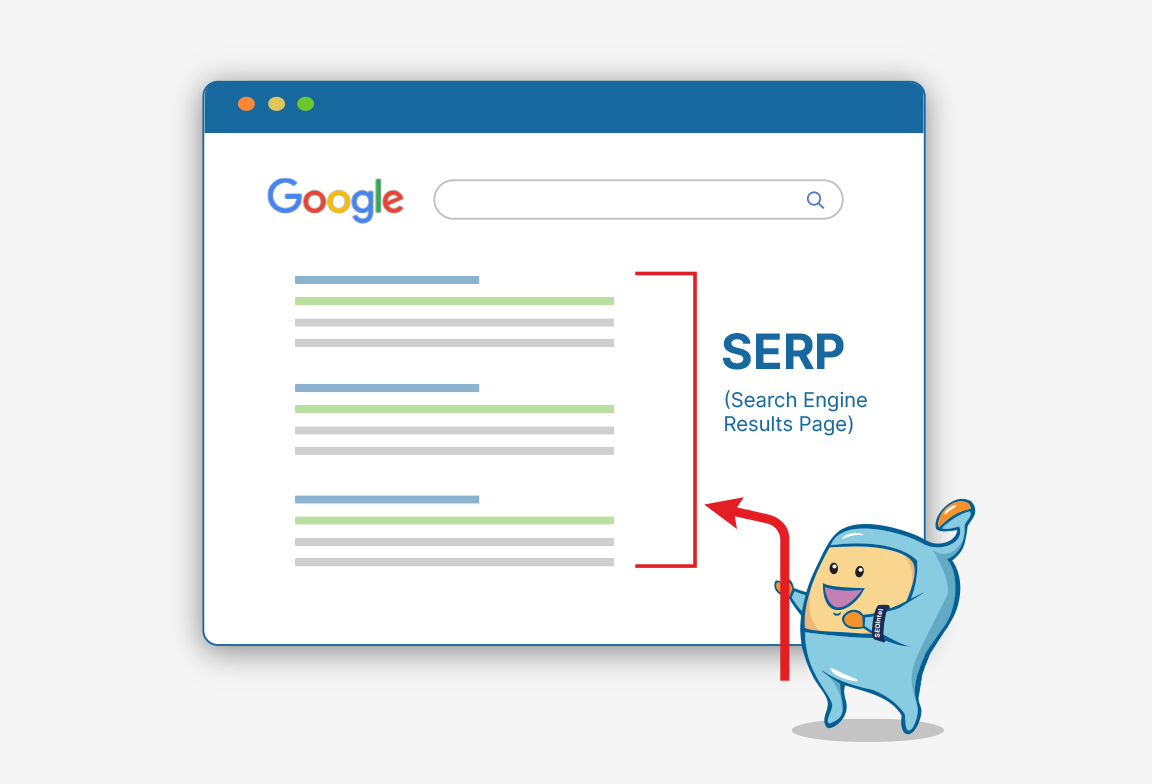
Search queries are strings of words a user forms to conduct an online search in a search engine. Each user’s search query also has an underlying intent, referred to as search intent.
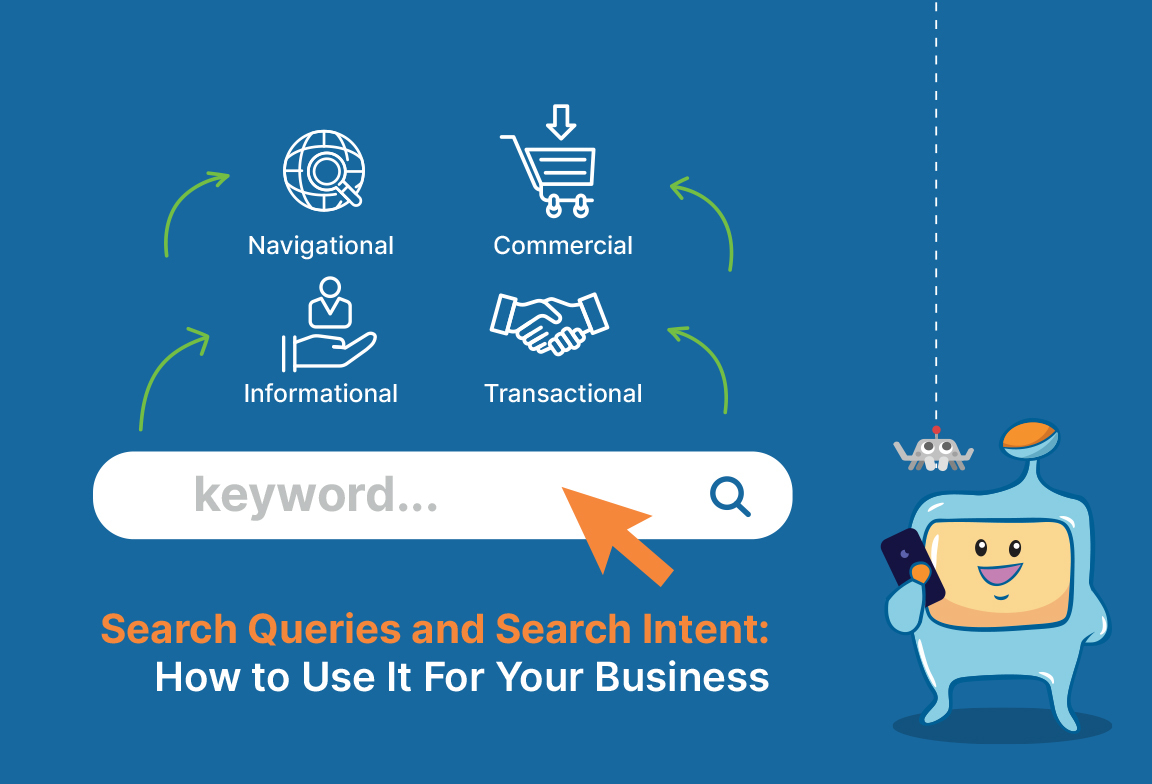
When a person wants to learn anything, such as background data about a topic or how to accomplish a specific activity, they use an informational question. Although the searcher isn't usually trying to buy something, the correct material can lead them to a specific brand.
That's why it's critical to generate relevant content that caters to your target audience's demands, requirements, and interests.
Including multimedia content on your website can help you attract visitors from informational queries. Here are a few instances to think about.
When people are considering purchasing something, such as a specific product or an item from a large category, they use transactional searches. Because transactional queries offer the highest income potential, keywords with a lot of bids for pay-per-click slots tend to have a lot of bids.
This means that, in addition to organic search results, people will see appropriate paid results for their transactional inquiries.
Paid ads are popular among businesses because they work; according to statistics from online advertising firm WordStream, paid ads account for nearly 65 percent of clicks on transactional SERPs.
Finding a specific site on the internet Navigational intent is the second form of search intent. This type of person wants to go to a specific website. People who look for Facebook online, for example, are likely heading to the Facebook website.
So you want to make sure that when someone searches for your company's name online, they can find your website.
Remember that ranking high for a navigational phrase is only useful if your site is the one that people are looking for. We had a Google Analytics plugin a few years ago, and we were rather well-ranked for the term [Google Analytics]. However, this did not result in any increased traffic to our website.
The majority of those searching for Google Analytics were seeking the Google Analytics website and were not interested in our plugin.
Users investigating products with the intent to purchase. Some people plan to buy in the (near) future and conduct their research on the internet. What is the best washing machine? Which SEO tool is the most beneficial?
These folks have transactional intent as well, but they require more effort and persuasion. Commercial exploring intents are the most common sort of search intent.
Fun Fact! Did you know that All SERPs are unique, even when two users search the same query?
That’s because Google personalized search results for its users in an attempt to display results that are relevant to each specific individual.
In general, you can break SERPs down in the following four ways:
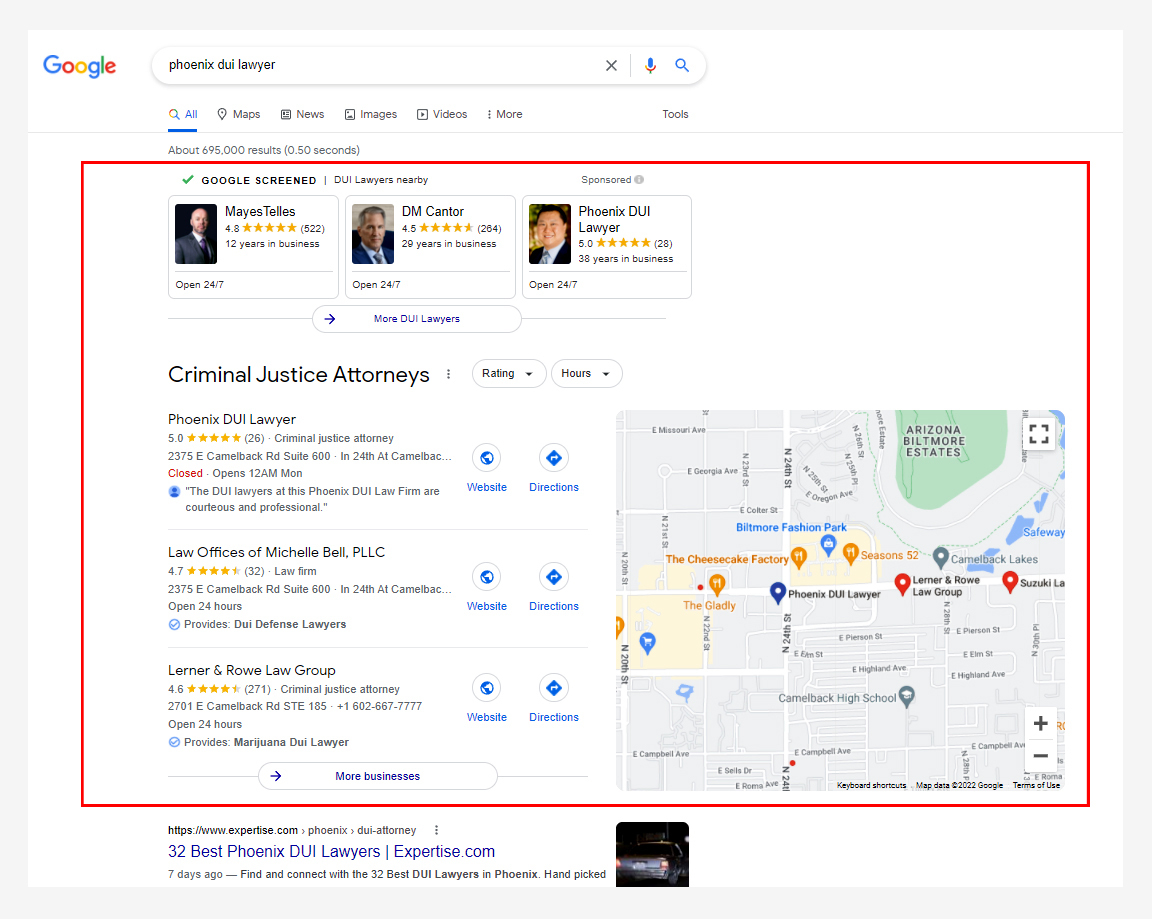
This is when results appear because advertisers paid money to put them there are called sponsored results. These are typically text ads or shopping results, and you’ll see Google Ads tagged as such. They may occur at the top or bottom of the page, as well as in the Google Knowledge Graph.
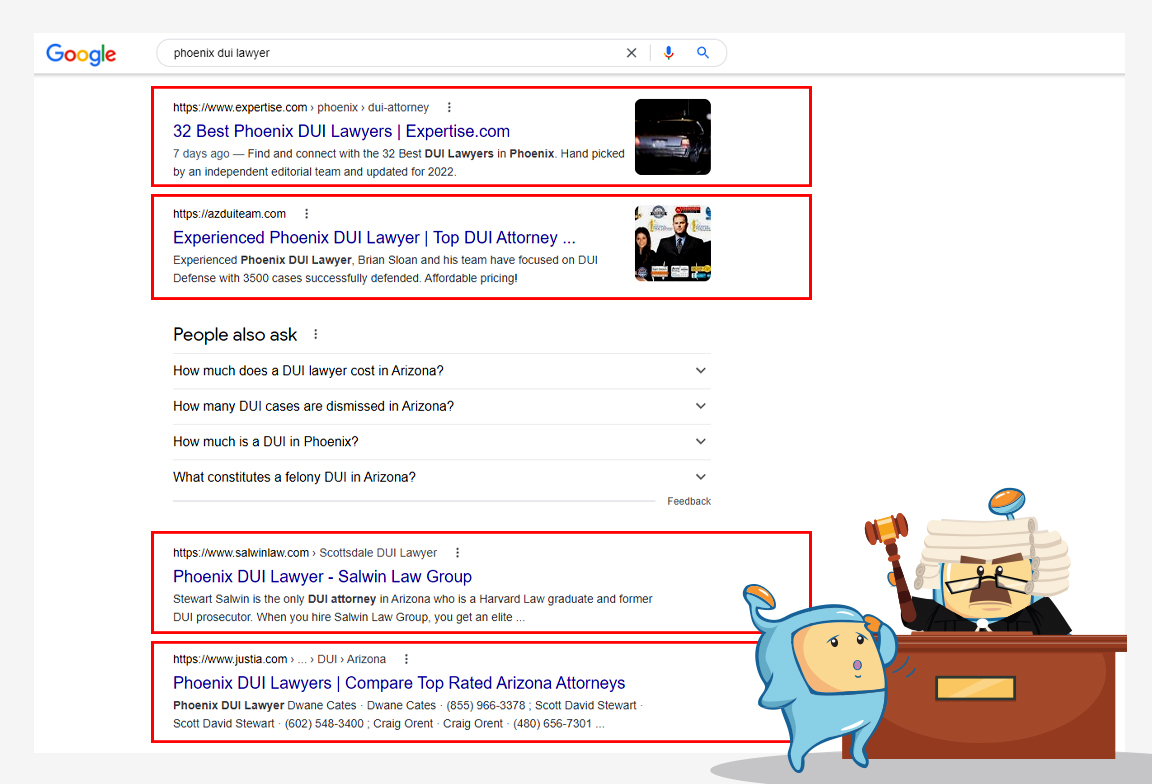
These are the listing of sites that you peruse when you search a query. In the example below, 28 Best Phoenix DUI Lawyers | Expertise.com represents the first organic result, followed by Experienced Phoenix DUI Lawyer.
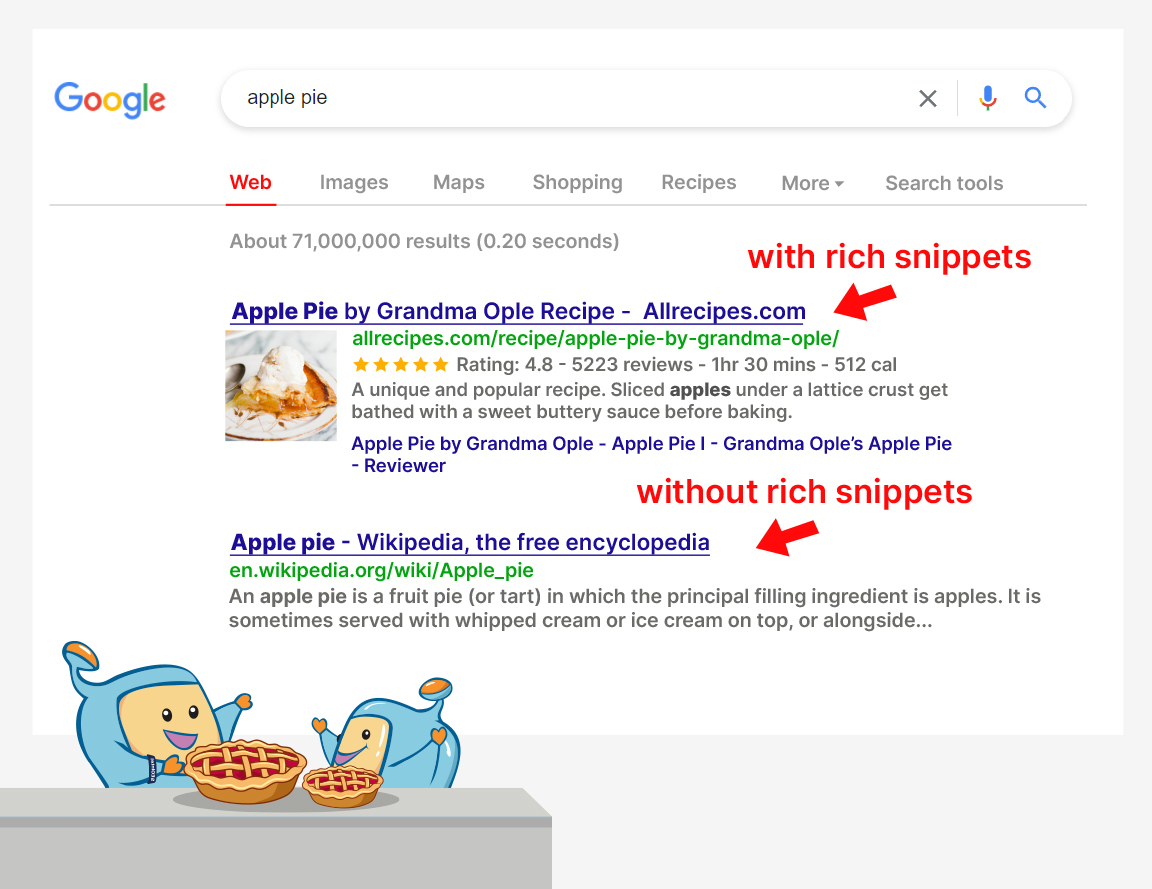
These add a visual layer (sometimes multiple layers) to the SERP. They include things like featured snippets, video carousels, online videos, news articles, and much more.
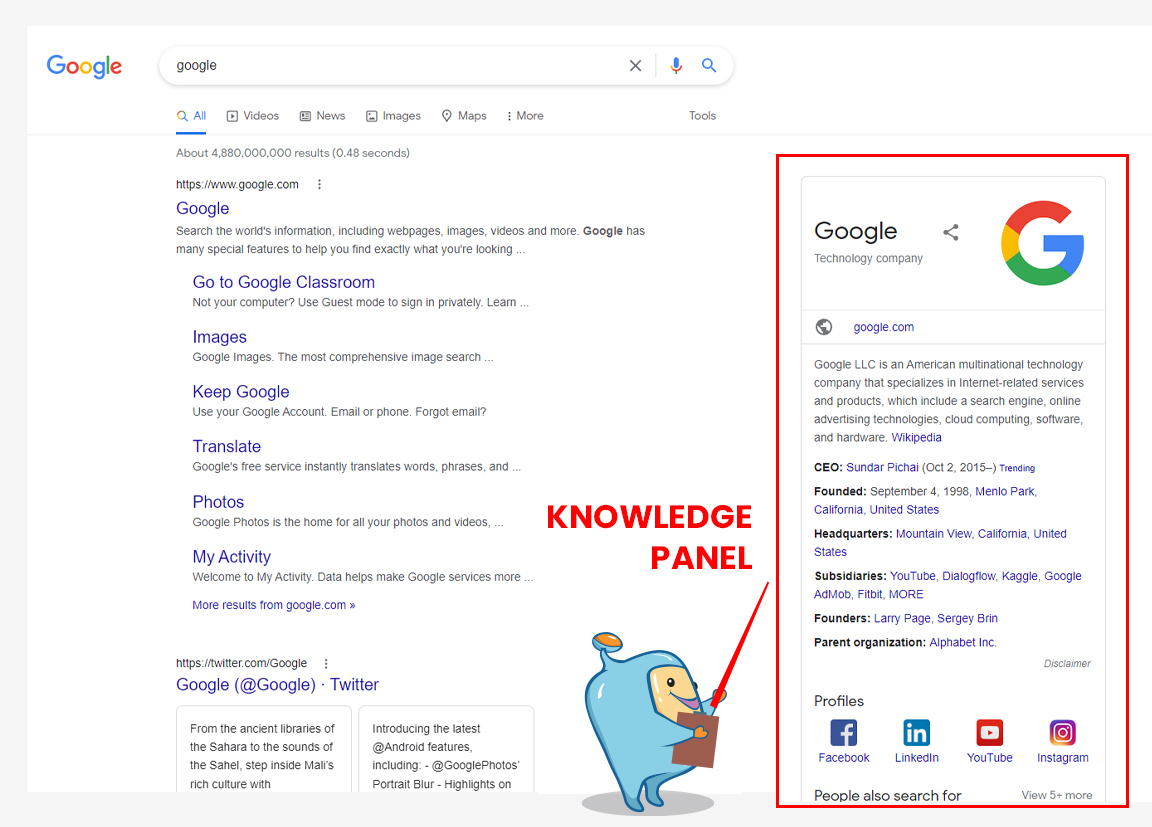
On the internet, there are hundreds of millions of pages, yet none are as sought as search engine results pages. In the world of SEO, ranking high in the search engine results pages can be a tough nut to crack.
Paid and organic search results make up the majority of the SERPs.
Google's search algorithm produces organic search results, which are web pages that surface as a result of Google's search algorithm. To put it another way, these are pages that Google has determined to be useful and relevant to the search query.
Even though Google's algorithm is a well-guarded secret, they have confirmed a few significant ranking elements, including:
The following is an example of a common organic search result snippet:

Because organic listings are not paid results, the space on the first page of results is extremely crowded. Optimizing pages for target keywords indicate to Google that your page is relevant to a user's search, which increases your chances of landing on page one.
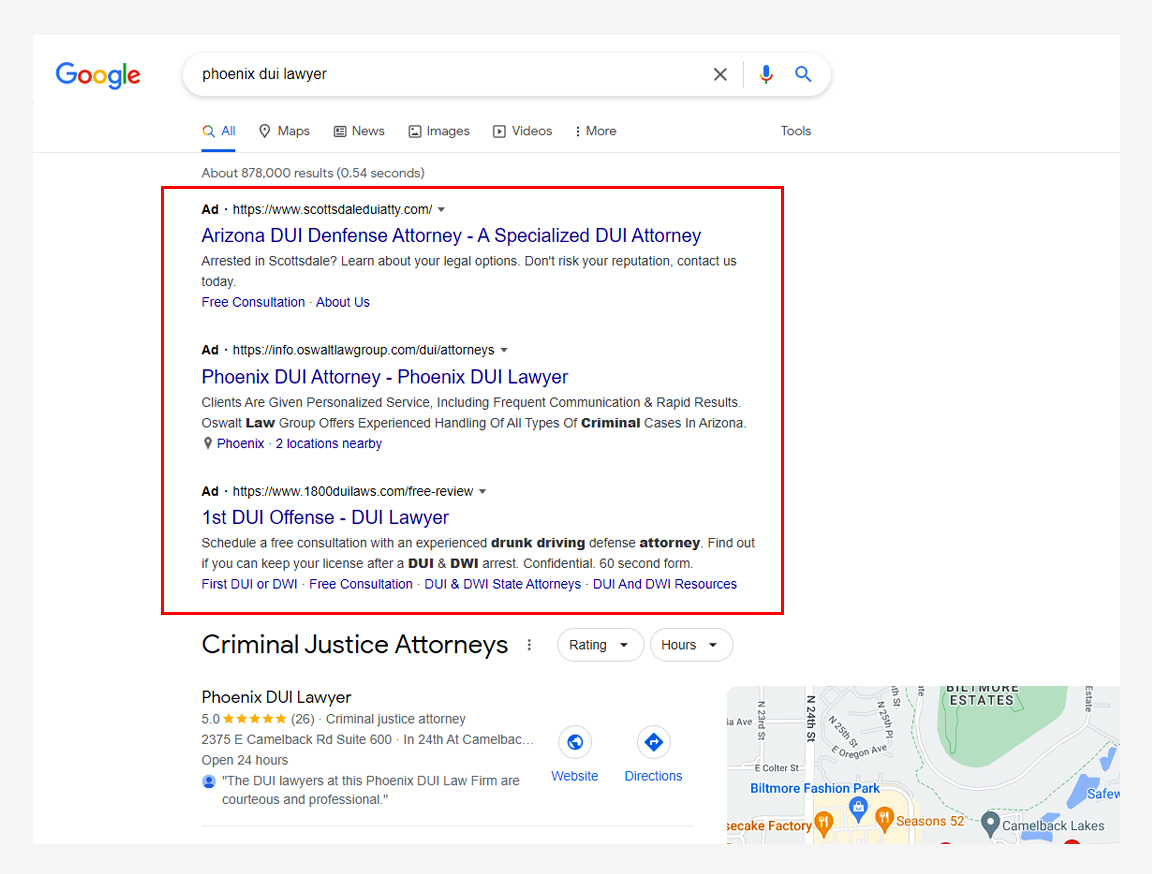
Paid search results typically appear before organic results.
However, they may appear later, or even on subsequent pages.
Paid ads are usually identified as such, although there isn't much of a distinction between a paid and organic result otherwise. Ads exist on 51.61 percent of first-page SERPs, according to Rank Ranger.
You'll have to compete with other advertisers bidding on a Pay-Per-Click (PPC) basis to rank on a sponsored result.
If your ad is relevant to the keyword and your targeting is correct, Google will choose the highest bidders.
You stop showing up when you stop paying/winning the auction.
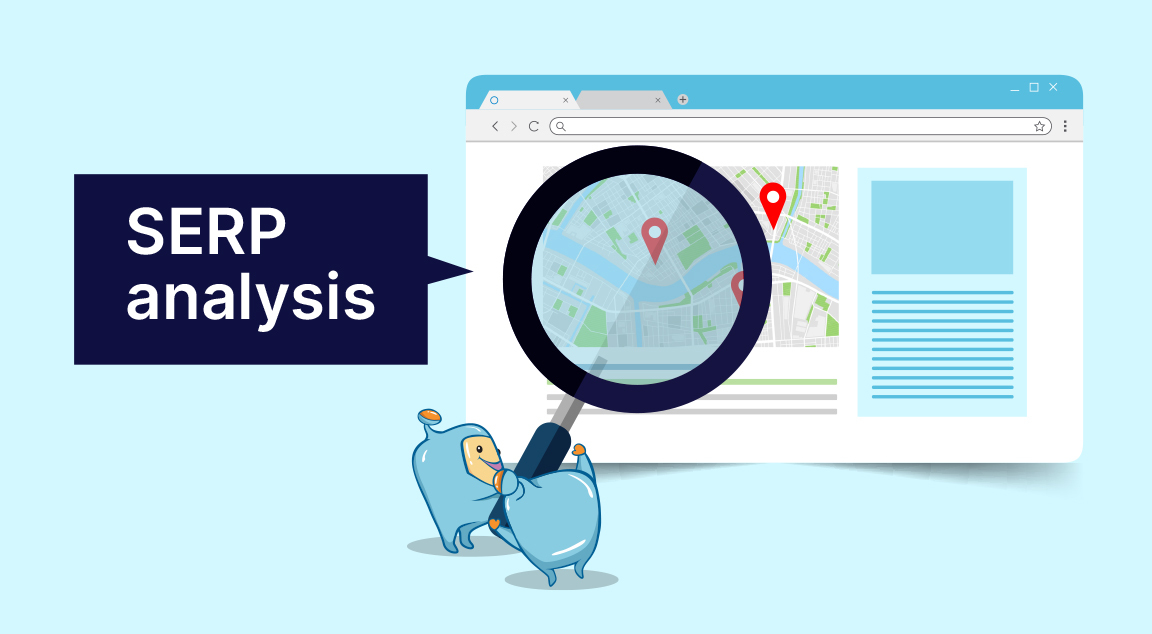
Let's speak about the actions you'll need to take to do your SERP analysis now that we know what SERP stands for and how it may help your business.
There are several approaches to SERP analysis, but each should incorporate the essential elements.
You need to know what keywords you're targeting and where they presently rank before you can examine how your content compares to competitors for search queries.
Make a list of your current keywords and a list of the phrases you don't rank for but want to target.
Keep an eye out for keywords in your industry that you might be able to target, as well as terms that are linked to your products and services.
Keywords that refer to your area and company name should also be considered.
Every keyword has a search goal, and the next stage in your SERP study will be to figure out what that intent is.
Examine your keyword lists and try to imagine what information a searcher looking for that keyword is looking for.
You can enhance your SEO and conversion rates by optimizing your content to answer those questions once you've understood the rationale behind a user's search.
Comparing where and how you rank concerning your competitors is an important component of your SERP analysis.
It can be challenging to get your sites to appear above others if a majority of your authoritative competitors are all attempting to rank high for specific search queries.
Check out where sources like Wikipedia and Quora rank, and see whether industry leaders are also ranking well for the keyword you're after.
You can also examine the top-ranking content for the keyword addresses, and make sure your material is even more comprehensive, uniquely tackling themes.
You'll need to know where your hidden opportunities are to know which way to go after your SERP research.
Look for keywords that have the potential to move up the SERP page rankings, and try to locate phrases that your competitors aren't utilizing.
Another trick is to look at the length of the keywords.
If you're having trouble discovering long-tailed, more particular keywords that aren't as competitive, consider looking for long-tailed, more precise keywords.
Not only will those terms be less competitive, but they will also be able to answer particular queries that users enter into search engines.
As said in the competitive analysis section, you should click on top results to check what kind of data your competitors are sharing for each phrase you wish to rank for.
Optimizing your content to make it more thorough and relevant can help you climb above the competition and be a better match for people's search intent.
You should also be analyzing your material regularly, adding new information where appropriate, and updating existing texts and images with SEO best practices and updated keywords.
The search algorithms will constantly examine your pages and provide you with chances to rank higher if you keep upgrading your content.
Search engines utilize complex algorithms that consider various factors like relevance, quality of content, user experience, and backlinks to determine the ranking of a website on SERPs.
Therefore, businesses and website owners must optimize their websites with effective SEO strategies to improve their chances of ranking higher on SERPs and maximizing their visibility to potential visitors and customers.
Appearing on the first page of SERPs is especially crucial since the majority of users tend to focus on the top results, making it a key goal for businesses aiming to increase their online presence and drive valuable organic traffic.